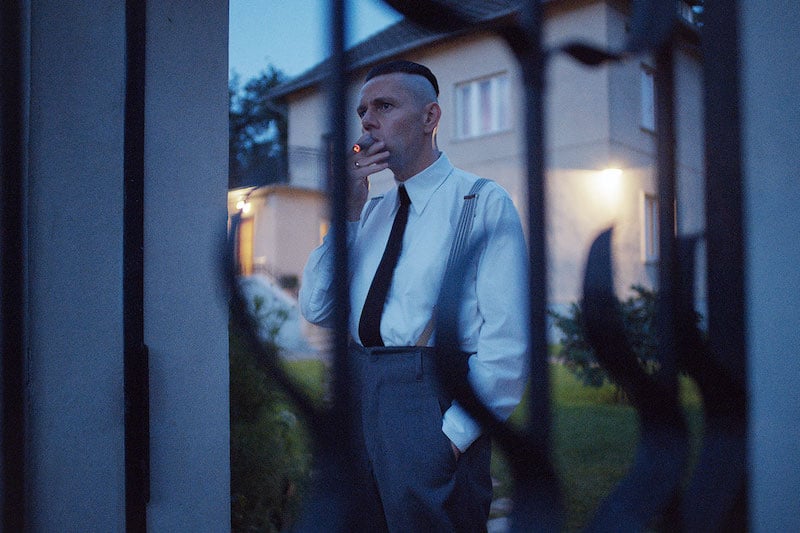As part of our coverage of the 42nd Vancouver International Film Festival, Meg Shields reviews Jonathan Glazer’s harrowing Holocaust film, ‘Zone of Interest.’ Follow along with more coverage in our Vancouver International Film Festival archives.
The Höss family home borders the towering walls of Auschwitz-Birkenau, the notorious extermination camp that single-handedly executed over 1.1 million people over the course of the Holocaust. The patriarch, Rudolf (Christian Friedel), works as the camp’s commandant, his blonde, blue-eyed family nestled squarely between train tracks and billowing chimneys, blissfully (and willfully) unconcerned with the horrors unfolding on the other side of their garden wall.
This is Zone of Interest, Jonathan Glazer’s loose adaptation of Martin Amis’ novel of the same name. The film was shot on location in collaboration with the Auschwitz Museum and secured the Grand Prize when it premiered at Cannes earlier this year. It is a divisive, necessarily challenging watch. And, for my money, it is easily one of the best films of this 2023 festival circuit.
For its nearly two-hour runtime, Zone of Interest forces us to observe the Höss family’s parody of domesticity: limiting our field of view to delicately hand-painted wallpaper; a thriving vegetable patch, and children playing pretend on emerald-green grass. We see Rudolf literally stop to smell the roses. And we watch joyful weekend excursions to a nearby river that will later flow with human waste from the newly constructed crematoriums.
Indeed, while Glazer keeps the true horror of Auschwitz visually obscured behind brick walls and thick reeds, the human tragedy can’t help but seep through the cracks. Barely coagulated blood is gently scrubbed from leather boots. Officers’ wives idly gossip while rifling through the seized possessions of their Jewish neighbors. And the Höss children blow human remains out of their noses, unaware that the black snot oozing from their nostrils used to be people.
If any film this year deserves to win the (now amalgamated) Academy Award for sound, this is it. Both Maximilian Behrens and Johnnie Burn (whose credits include Poor Things, Nope, and Glazer’s own Under the Skin) have done something extraordinary here: gesturing, through sound alone, to the Hell just out of sight: ghostly screams, barked death sentences, and mechanical grinding that never let us forget what’s happening.
Even without directly witnessing anything, the film’s various distancing techniques only serve to emphasize the camp’s presence. Polish cinematographer Łukasz Żal (Cold War, I’m Thinking of Ending Things) consistently positions the family directly between us and the camp: a middle distance that prevents us (mercifully) from fully entering the Höss’ home, while simultaneously keeping us constantly aware of the nightmare churning away in the background.
At this point, we’re all familiar with the idea that the Holocaust thrived on mundanity and voluntary ignorance; that the evil that fuelled those fires was banal and not exceptional in nature. If you’re not interested in the formal problem of how to represent that nefarious normalcy on-screen, this film may not be for you. But for what it’s worth: I think Glazer’s representation of the ordinariness of the Holocaust (and the psychic lengths Germans went to stay ignorant about it) is really well done.
I should hope this goes without saying, but Zone of Interest is a very hard watch: a tough sell compounded by the fact that its core cast is entirely made up of human monsters. Anyone who’s seen Toni Erdman (or this year’s Anatomy of a Fall) knows that Sandra Hüller is the real deal; a true talent who captivates even when she’s positively despicable. I wouldn’t be surprised if she was booed on her way to the awards podium. She’s that disgusting.
Glazer isn’t in the business of redeeming these characters or presenting them as anything other than complicit. No one questions or calls attention to what they are doing. The one supporting character who does object leaves wordlessly like a thief in the night without an explanation. There is no patronizing “Are we the baddies?” moment. And there is no attempt to contextualize or provide a backstory as to why these people would go along with, or accept, any of this.
Suffice it to say: this isn’t a film I recommend lightly and I certainly wouldn’t think any less of someone who chose not to watch it. Boredom and offense are valid (and arguably intended) reactions. Some of the most heated and interesting discussions I had with other critics were about this very film. I suspect louder echoes of these debates will occur when Zone of Interest is finally let loose on the public.
Without spoiling the specifics, Zone of Interest’s final moments contain the most alarming and creatively justified 180-degree rule break I’ve ever seen. While the film’s supernatural malignancy rears up in the otherworldly thermal vignettes and Mica Levi’s hellishly industrial score, Glazer saves his most brazen departure with narrative form for his finisher: an unambiguous reminder that there are still people who “work at Auschwitz.” They are the custodians of evidence that all of this really happened. And they are dedicated to ensuring that we don’t hide the worst chapters in human history behind a brick wall or a white picket fence.
As of the publishing of this review, Zone of Interest is set for an American release on December 8th, 2023.

